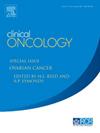Socioeconomic Deprivation Correlates With Incomplete Radiotherapy Treatment in Head and Neck Cancer
IF 3.2
3区 医学
Q2 ONCOLOGY
引用次数: 0
Abstract
There is a high burden of socioeconomic deprivation across Merseyside and, along with this, poorer cancer outcomes. The incidence of head and neck squamous cell carcinoma (HNSCC) within this region is higher than the national average and there are often additional complexities to individual treatment pathways such as poor health literacy, lack of social support and transport options which can impact on adherence to prescribed treatments.
Aims
This work aims to understand the impact of deprivation on patients diagnosed with HNSCC undergoing chemoradiotherapy (CRT) or radiotherapy (RT) treatment by identifying barriers to adherence.
Materials and methods
Patients with HNSCC treated between June 2022 and June 2023 were included and data was collected through retrospective case note review. Approval was obtained from relevant NHS institution audit departments. Key examined variables were indices of multiple deprivation (IMD), unplanned admission rate, hospital transport use, social support network and provision of additional ad hoc appointments during treatment courses. All were correlated with missed radiotherapy appointments.
Results
Out of 359 evaluable patients there were high levels of unplanned appointments with health professionals during CRT/RT (71% of those receiving CRT and 55% of those having RT). 11% (n = 39) missed at least one radiotherapy appointment with the commonest reason being unplanned admission to hospital. Despite missed appointments, 25/39 patients completed treatment within prescribed window due to effective RT compensation strategies. On multivariate analysis, unplanned admission, hospital-provided transport and crime deprivation quintiles (p=<0.001, p = 0.007 and p = 0.027, respectively) were found to significantly increase the chance of missed radiotherapy treatment appointments.
Conclusion
High levels of unplanned encounters with health care professionals are encouraging adherence to non-surgical HNSCC treatments. Formalising these ad hoc appointments will provide an equitable, robust service. Undertaking hospital transport increases the potential for missed treatment appointments. Gaining insight into patient experiences and investing in improved transport services are essential for maximising adherence.
社会经济贫困与头颈癌放疗不彻底有关
默西塞德郡的社会经济贫困程度较高,因此癌症治疗效果也较差。该地区头颈部鳞状细胞癌(HNSCC)的发病率高于全国平均水平,而且个人治疗路径往往更加复杂,如健康知识匮乏、缺乏社会支持和交通选择等,这些都会影响患者坚持处方治疗。目的:本研究旨在通过确定坚持治疗的障碍,了解贫困对确诊接受化学放疗(CRT)或放射治疗(RT)的 HNSCC 患者的影响:纳入2022年6月至2023年6月期间接受治疗的HNSCC患者,通过回顾性病例收集数据。研究获得了相关 NHS 机构审计部门的批准。主要考察变量包括多重贫困指数(IMD)、非计划入院率、医院交通使用情况、社会支持网络以及治疗过程中提供的额外临时预约。所有变量都与错过放疗预约有关:在 359 名可评估的患者中,CRT/RT 期间与医护人员的计划外预约率很高(71% 的患者接受了 CRT,55% 的患者接受了 RT)。11%的患者(39 人)错过了至少一次放疗预约,最常见的原因是计划外入院。尽管错过了预约时间,但由于采取了有效的 RT 补偿策略,25/39 名患者在规定时间内完成了治疗。在多变量分析中,非计划入院、医院提供的交通和犯罪率五分位数(p=结论:与医护人员的高水平非计划性会面鼓励患者坚持接受 HNSCC 非手术治疗。将这些临时预约正式化将提供公平、可靠的服务。进行医院交通会增加错过治疗预约的可能性。深入了解患者的经历并投资改善交通服务,对于最大限度地提高患者坚持治疗的积极性至关重要。
本文章由计算机程序翻译,如有差异,请以英文原文为准。
求助全文
约1分钟内获得全文
求助全文
来源期刊

Clinical oncology
医学-肿瘤学
CiteScore
5.20
自引率
8.80%
发文量
332
审稿时长
40 days
期刊介绍:
Clinical Oncology is an International cancer journal covering all aspects of the clinical management of cancer patients, reflecting a multidisciplinary approach to therapy. Papers, editorials and reviews are published on all types of malignant disease embracing, pathology, diagnosis and treatment, including radiotherapy, chemotherapy, surgery, combined modality treatment and palliative care. Research and review papers covering epidemiology, radiobiology, radiation physics, tumour biology, and immunology are also published, together with letters to the editor, case reports and book reviews.
 求助内容:
求助内容: 应助结果提醒方式:
应助结果提醒方式:


